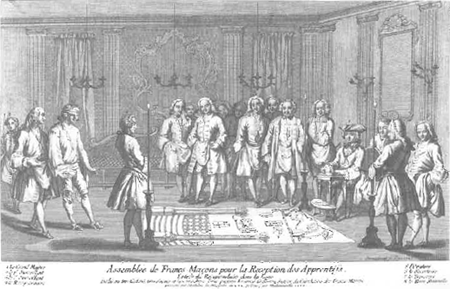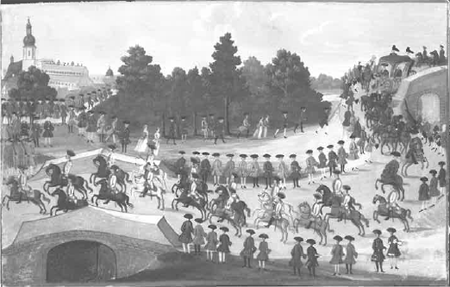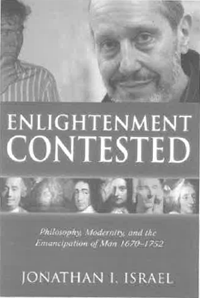De Achttiende Eeuw. Jaargang 39
(2007)– [tijdschrift] Documentatieblad werkgroep Achttiende eeuw–
[pagina 52]
| |||||||||||||||||||
Berichten uit de geleerde wereld
| |||||||||||||||||||
Contesting the canonWith his books, Israel has brought about a number of revolutions (in the early modern meaning) in the historiography of the Enlightenment. First, his point of departure is not France, not Scotland, not Prussia, | |||||||||||||||||||
[pagina 53]
| |||||||||||||||||||
but the Dutch Republic, a country which had a reputation as transit port of ideas, but was not very well known as ‘a centre of gravity’ of radical enlightened ideas. On the contrary, the Dutch Enlightenment was often described as a diluted extract of the French model. Although Israel was not the first to emphasize the importance of Dutch radical philosophers,Ga naar voetnoot3 as he was not the first to emphasize the idea of a Radical Enlightenment,Ga naar voetnoot4 for the larger public he put these ideas on the map. Among many others, the Dutch liberal criticasters of political correctness Paul Cliteur and Herman Philipse embraced the book.Ga naar voetnoot5 After praising Israel's Radical Enlightenment in his column in the weekly TV discussion programme Buitenhof, Paul Cliteur concluded that the key to Europe's unity is to be found in one philosopher. The European calendar should not have been fixed on 2004 after Christ but, so he calculated, on 372 after Spinoza. And in his letter to Ayaan Hirsi Ali, Herman Philipse concluded that Ayaan is a contemporary representative of the Radical Enlightenment. In their philosophical struggle with religions, the convinced atheists Cliteur and Philipse appropriated Israel's work. Secondly, Israel develops a whole new canon of radical enlightened thinkers, to which neither John Locke, David Hume, Voltaire, Montesquieu, Turgot, the later Jean-Jacques Rousseau, nor Immanuel Kant belonged, but first and foremost Baruch de Spinoza, and after him Adriaen Koerbagh, Lodewijk Meyer, Adriaen Beverland, John Toland, Theodor Ludwig Lau, Pierre Bayle, Bernard le Bovier de Fontenelle, Denis Diderot and many, many others. For Israel, the Enlightenment that matters most to us today, both historically and philosophically, is Radical, not Moderate, nor Counter. It seems likely that particularly his outspoken views on the conservative Moderate Enlightenment, which he develops further in Enlightenment Contested, will be contested by historians, who, for example, emphasize the progressivism of the Scottish Enlightenment, whereas Israel emphasizes the conservatism of its representatives, particularly of David Hume. Thirdly, Israel sees the Radical Enlightenment as a cross-border phenomenon, as an integral and vital part of a wider picture, which should not be squeezed into the constricting strait-jacket of ‘national history’, but considered as internationally cohesive. Indeed, as it appears from their correspondences, the eighteenth-century intellectuals were often very international in scope. Not only were they used to reading books from all over Europe in Latin, they were also often able to read the most important books written in foreign languages soon after they were published, since it was common to translate these rather quickly. Israel's point of view is quite a challenge to his peer historians, who really have to learn their languages, to be able to test this claim themselves. Fourthly, Israel considers the Radical Enlightenment the essential step in the Making of Modernity, meaning the emergence of a complex of abstract philosophical concepts of which the primacy of reason, the denial of all miracles and of revelation, democracy, racial equality, feminism, religious toleration, sexual emancipation and freedom of expression are the most important. Historically, Israel sees a continuous triangular conflict from | |||||||||||||||||||
[pagina 54]
| |||||||||||||||||||
the end of the seventeenth century down to today, between the three main intellectual blocs on the threshold of Modernity: the Radical Enlightenment, the Moderate mainstream, and the Counter Enlightenment. In this, Israel follows and adapts Darrin McMahon's position, that to this very day there has been a continuous and fundamental ‘dialectic of Enlightenment and Counter-Enlightenment’, which was not confined to France alone.Ga naar voetnoot6 Israel's Radical Enlightenment is widely discussed among historians.Ga naar voetnoot7 Many historians tend to think that the author makes Spinoza and the Spinozists more important than they were. In Israel's seventeenth and eighteenth century, Spinoza's ghost image seemed to lurk behind every corner, but one may ask if his texts were read by many and if his arguments were discussed so widely as Israel suggests. In the eighteenth century, German missionaries even found Spinozism among the Hindus in Southern India. For them, Spinozism was nothing new, since, they wrote, it was already described in the Book of Wisdom 1:2 and in Ecclesiastes 3:19. Also, it resembled Cicero's teaching in De natura deorum, and the worldview of Plato's academics.Ga naar voetnoot8 The Early Modern reception of Spinozism is comparable to that of communism in the United States in the 1950s: It seemed to be everywhere, but it was not clear how many were really inspired by the communist threat. Today the word terrorism seems to have a comparable effect on politicians. Other historians say that Israel is less interested in the social history of ideas, a field which has become so important in the last decades. The question as to who read the radical enlightened literature, or how subversive ideas were spread, seems to be not his main focus of attention. With his three-part division, Israel not only reconsiders the traditional concept of Enlightenment as a whole, he also points out a new meaning of Modernity, which did not originate in Jürgen Habermas' bourgeois public sphere of salons, clubs, coffee houses and literary societies,Ga naar voetnoot9 but was crystallized in the subversive ideas of Spinoza and the Spinozists. | |||||||||||||||||||
Controversialist approachOne of the most positive traits of Jonathan Israel is his willingness to defend and explain his position in the field, to take part in the intellectual debate, and to face criticism. His books almost force the readers to take a position themselves. It is likely that Enlightenment Contested will provoke more debate among historians than Radical Enlightenment did, because of its overall view of the Radical, Moderate and Counter Enlightenments in the course of the long eighteenth century, and because of its challenging statements. Israel not only challenges his critics by emphasizing again and again the importance of Spinozism, but also by disavowing freemasonry as a rather peripheral phenomenon, seen from a strictly ‘enlightened’ viewpoint, since it | |||||||||||||||||||
[pagina 55]
| |||||||||||||||||||
hardly ever tried to erase distinctions between aristocracy, high bourgeoisie and the common man: ‘If our aim is to get to the heart of the Enlightenment as a decisively important worldhistorical phenomenon, arguably, the less said about Freemasonry the better.’Ga naar voetnoot10 In his latest book, Modernity is certainly not defined by what the author calls ‘diffusionist’ new social history, with its leading scholar Robert Darnton, but by ‘new intellectual history’. Israel's books once more emphasize the power of ideas.
 Entrance of a candidate into a masonic lodge, engraving of Johann Martin Bernigeroth in Les coutumes des Francs-Maçons (Leipzig 1745).
As a reaction to his critics, Israel, following the Dutch historian Siep Stuurman, develops a ‘controversialist approach’, which focuses less on finished theories and more on arguments and debates, less on major thinkers and more on the process of thinking.Ga naar voetnoot11 The richness of his work makes it possible to discuss many different aspects; here, I will limit myself to three points. First, I think the controversialist approach makes sense, particularly for the Early Modern period, with its pamphlet wars, and its severe theological and philosophical polemics. By broadening the concept of ‘argument’, Israel includes not just political, legal, and ecclesiastical interventions in polemical debates, but also popular protest. However, I doubt whether Israel's controversialist approach always corresponds with his main interest in the Radical Enlightenment. Indeed, the Radical Enlightenment was a widespread philosophical underground, but many radicals themselves were marginalized, silenced, ignored or criminalized as heterodox. Often, the more established representatives of the Moderate Enlightenment were main figures in the controversies, such as Christian Wolff, Voltaire and Montesquieu. The Wolffian Controversies in particu- | |||||||||||||||||||
[pagina 56]
| |||||||||||||||||||
lar illustrate my argument. Neither Wolff nor the Pietists were part of what Israel defines as the Radical Enlightenment. It is very well possible that Wolff was blamed by his Pietist opponents for knowingly opening the gates to Spinozism, but even they would have known better. Wolff's rationalistic philosophy was designed to stem the tide of materialism, atheism and Spinozism. And as a defender of the concept of ‘natural religion’, Wolff was not criticizing social hierarchies as such, but set other ‘natural religions’, such as the Chinese, as an example for Christianity.
 Triumphal entry of Christian Wolff into Halle, 6 December 1740, from a student album amicorum (thanks to the proprietor and to Cornelia Zimmermann, Christian-Wolff-Haus, Halle)
Wolff provoked the Pietists by asserting that although the Chinese generally did not have knowledge of the Bible, their basic principles of wisdom were comparable with his own Christian views. To establish an acceptable system of ethics and good governance, it was not necessary to rely on Christian revelation, so Wolff argued. But the highest virtue is beyond human possibilities based on God-given revelation.Ga naar voetnoot12 Evidently, Wolff's rationalistic philosophy was a bridge too far for the Pietists, who, in their attempt to reconcile faith and ratio in every conceivable way, were hostile to the claims of autonomous reason. They successfully strove for Wolff's expulsion from Halle, which took place in 1723, two years after Wolff had held his lecture on the practical philosophy of the Chinese. However, immediately after Frederick II ascended the Prussian throne in 1740, Wolff triumphantly returned to Halle. He became a member of many academies and was one of the first scholars who was created a hereditary nobleman of the Holy Roman Empire on the basis of his academic work. Soon after Maximilian III Joseph had become the Elector of Bavaria in 1745, he | |||||||||||||||||||
[pagina 57]
| |||||||||||||||||||
conferred the title of Reichsfreiherr on the learned Christian Wolff. To understand the particular contexts, contents and connotations of the eighteenth-century controversies, it makes sense to differentiate the many, sometimes overlapping Weltanschauungen at the time, such as Socinian, Cartesian, Spinozist, Newtonian, orthodox, fideist, deist, sceptic, libertine, empirical, monist, rationalistic, materialistic, physico-theological, physiocratic, neological, cameralistic, et cetera. In general, by focusing on the Radical Enlightenment as the Enlightenment that matters most to us, one could easily overlook the developments which were typical of the eighteenth century. Also, by emphasising the controversies, one could easily lose sight of less controversial, but above all influential scholars like Carl Linnaeus. Whereas Israel discusses the encyclopaedic works of Georges-Louis Leclerc de Buffon and Denis Diderot at length, Button's antipode and inspirer Linneaus is just discussed twice in Radical Enlightenment and mentioned once in Enlightenment Contested. One may ask who has been more influential in the eighteenth century. | |||||||||||||||||||
Philosophical RevolutionThis brings me to my second point: The Making of Modernity. Israel's books certainly revaluate the seventeenth century, well known for the Scientific Revolution. His seminal works highlight the start of what I would call a Philosophical Revolution as well, which took place mainly between 1680 and 1750. What happened after 1750 seems to have less relevance, since by then, to quote Radical Enlightenment, ‘All major intellectual innovations and accomplishments of the European Enlightenment were well advanced if not largely complete.’Ga naar voetnoot13 The completion of this Philosophical Revolution had already taken place. In general, such a view could easily lead to an ahistoric concept of history, to the idea that democracy in Athens is comparable with democracy in England after the Glorious Revolution, with democracy nowadays, in the United States or in the Netherlands. It is indeed very important to draw the attention of the wider public to the radical enlightened philosophes, who opposed tyranny, intolerance, credulity, superstition and ecclesiastical sway, but as a historian I am particularly interested in the question which intolerance, which credulity, which superstition and which ecclesiastical sway they were opposing. Of course, this is Israel's concern as well, but in his Postscript to Enlightenment Contested he understands Modernity as a philosophical package of basic concepts and rationally validated values, which not only were, but remain today inherently superior. Did this package remain the same over the centuries? Shouldn't we account for the possibility that, although words remain the same, their meanings could be variable - often depending on who speaks to whom -, and could change over time drastically? To give an example. When George Berkeley in 1732 referred to Spinoza as ‘the great leader of our modern infidels’, it is important to realize that he wrote this in his dialogue Alciphron, a work of Christian apologetics, directed against those who are called ‘freethinkers’, whom the later bishop considered the enemies of the Anglican church.Ga naar voetnoot14 In addition, I am interested to know how the history of the Radical Enlightenment will end. For several historians, the nineteenth century is the bête noir of history, since orientalism, racism and impe- | |||||||||||||||||||
[pagina 58]
| |||||||||||||||||||
rialism found a firm base in this period.Ga naar voetnoot15 However, in Enlightenment Contested, the period of the Radical Enlightenment is extended from the 1650s to the age of Heine, Marx and Hölderlin.Ga naar voetnoot16 Yet, the question is whether the acknowledgement of a Radical Enlightenment implies that what happened afterwards is less important for the development of Modernity, of liberal democracy, of individual freedom and of human rights. | |||||||||||||||||||
Multiple Enlightenments?This brings me to my last point. In his Postscript to Enlightenment Contested, Jonathan Israel asserts that the ‘Which Enlightenment’ debate is fundamentally misleading.Ga naar voetnoot17 The idea of different families of the Enlightenment leads to a distraction from the core issues, and even to a meaningless relativism contributing to the loss of basic values needed by modern society. However, the idea of linking core values with a certain period of history bears a risk: Others may link other values with more or less the same period. Whereas Israel sees an inextricable connection between Spinoza and Modernity, others, like John Gray, make up a link between the Jacobines and totalitarianism, between what he calls Enlightenment and Auschwitz.Ga naar voetnoot18 Gray's position can be traced back to Adorno's and Horkheimer's Enlightenment critique, developed in 1944, when they were trying to find an answer to contemporary barbarism.Ga naar voetnoot19 As such, this critique had more to do with their contemporary situation as German exiles than with the history of the eighteenth century. Still, their work has left deep marks on postmodernist philosophy. Israel's ideas should be explained as an answer to any relativist view of the Enlightenment. However, the idea of multiple Enlightenments does not necessarily coincide with relativism, but acknowledges the many different contexts of the history of the eighteenth century. Indeed, historians should in no way distract their students from the core issues, but simultaneously they should endeavour to ground these issues in the political, religious and cultural circumstances of the Enlightenment cultures.Ga naar voetnoot20 Any historian who studies this period has to face the problem that, after all, there remain many answers to the question what Enlightenment is. The period of the long eighteenth century is labelled in numerous different ways, often focussing on various centres and periods in history: les Lumières (plural), Früh-Aufklärung, Spät-Aufklärung, the High Enlightenment, the Radical, Moderate and Counter-Enlightenment, the theological, the Arminian, and the Kantian Enlightenment, the Jewish Haskalah, the Scottish Enlightenment, and so on. Until recently many authors used just one of these concepts as if they were writing about the Enlightenment History without even explaining which Enlightenment history they meant. Now, thanks to the contemporary Enlightenment debates among historians and philosophers, scholars cannot write about The Enlightenment without explaining which concept they adhere to. The topicality of the subject | |||||||||||||||||||
[pagina 59]
| |||||||||||||||||||
forces scholars to specify. The alternative is having no debate about which Enlightenment one speaks of. This would be an unfortunate development, in this sense, the controversialist approach of the Radical Enlightenment, and of its researchers, should be set as an example for present-day debates about the history of the eighteenth century. | |||||||||||||||||||
Literature
| |||||||||||||||||||
[pagina 60]
| |||||||||||||||||||
|
|


